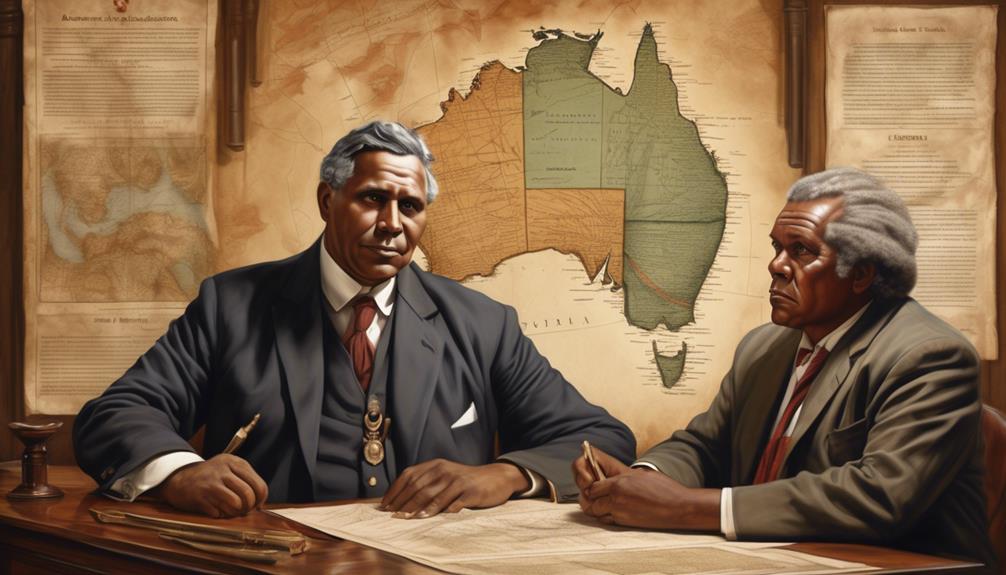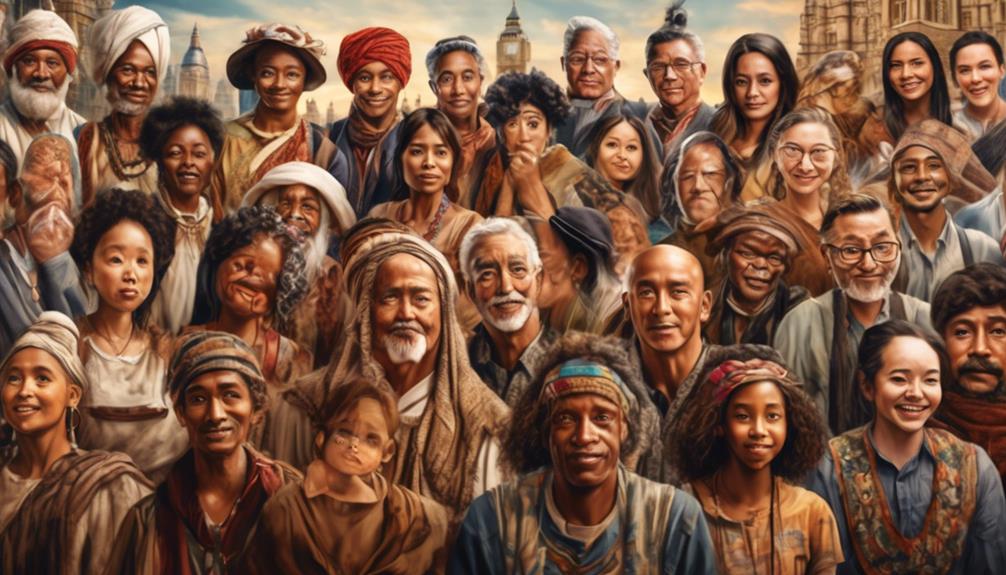When examining the historical interactions between British settlers and Aboriginal Australians, a significant issue that stands out is the absence of a formal agreement between the two groups. The lack of a treaty can be attributed to a multitude of factors, such as the unequal power dynamics and supremacy of the British settlers, as well as the cultural misinterpretations and language barriers that hindered productive communication and negotiation.
Furthermore, legal and political impediments played a significant role in shaping the landscape of colonial interactions, leaving a lasting impact on contemporary relationships between the two communities. This raises the question: What specific historical events and dynamics contributed to the failure to establish a treaty, and how do these factors continue to shape the relationship between British settlers and Aboriginal Australians today?
Key Takeaways
- The absence of a treaty between British settlers and Aboriginal Australians resulted in widespread dispossession of land and destruction of cultural practices.
- The power imbalance and control dynamics led to severe mistreatment, systemic oppression, and marginalization of Aboriginal people, with limited access to education, healthcare, and economic opportunities.
- Cultural misunderstandings and communication barriers hindered dialogue and understanding between settlers and Aboriginal Australians, emphasizing the need for empathy, understanding, and cultural adaptation.
- Legal and political impediments, such as outdated laws and disputes over land ownership, limited political representation, and inadequate legal protections, have contributed to a lack of justice and inclusivity for Aboriginal Australians.
Historical Context of Colonization
As we delve into the historical context of colonization, it's crucial to acknowledge the profound impact it had on the lives of Aboriginal Australians. The colonial expansion led to widespread dispossession of land, destruction of cultural practices, and severe mistreatment of indigenous communities. This period marked a dark chapter in history, characterized by systemic oppression and marginalization of the Aboriginal people.
Amidst the colonial expansion, Aboriginal Australians demonstrated remarkable resilience through indigenous resistance. They fiercely fought against the injustices inflicted upon them, striving to protect their land, culture, and way of life. Despite facing overwhelming odds, indigenous communities displayed unwavering strength and determination in the face of adversity.
It is imperative to recognize the enduring legacy of this historical trauma and its ongoing impact on Aboriginal Australians. By understanding the complexities of colonization and honoring the resilience of indigenous communities, we can work towards rectifying historical injustices and supporting initiatives that empower and uplift Aboriginal voices.
As we reflect on this tumultuous period, it's essential to approach the conversation with empathy, critical analysis, and a commitment to serving the needs of Aboriginal communities.
Power Imbalance and Control

How do power imbalances and control dynamics shape the historical and contemporary experiences of Aboriginal Australians?
- Dominance: The historical power dynamics between British settlers and Aboriginal Australians created a system of dominance that marginalized the indigenous population, leading to a loss of autonomy and control over their lands and resources.
- Marginalization: The ongoing power imbalance has resulted in the marginalization of Aboriginal communities, limiting their access to education, healthcare, and economic opportunities, further perpetuating the cycle of inequality.
- Control: The imposition of external control mechanisms by colonial powers disrupted traditional Aboriginal governance structures and decision-making processes, eroding their ability to shape their own destinies.
- Inequality: Today, the enduring legacy of these power imbalances is evident in the stark social and economic inequalities experienced by Aboriginal Australians, highlighting the pervasive impact of historical control dynamics on contemporary society.
It is crucial to recognize and address the enduring effects of historical power imbalances and control dynamics on Aboriginal Australians. By acknowledging these realities, we can work towards creating a more equitable and inclusive future for all members of society.
Cultural Misunderstandings and Communication
The enduring impact of power imbalances and control dynamics on Aboriginal Australians underscores the critical need to address cultural misunderstandings and improve communication between different communities. Language barriers and misinterpretations have often led to conflicts and hindered effective dialogue between the British settlers and the Aboriginal Australians. Cultural differences, including non-verbal communication cues, have also contributed to misunderstandings and deepened the divide between the two communities.
Recognizing these challenges, it's imperative to approach communication with a deep sense of empathy and understanding. Both parties must acknowledge the historical context that has shaped their respective communication styles and be open to learning and adapting to each other's cultural norms. This necessitates a critical evaluation of the power dynamics at play and a commitment to fostering an inclusive environment where all voices are valued and understood.
Improving communication requires active efforts to bridge the gap created by centuries of miscommunication. This entails creating platforms for open dialogue, investing in language and cultural exchange programs, and promoting awareness of non-verbal communication cues. By addressing these cultural misunderstandings and communication barriers, we can pave the way for a more harmonious and mutually respectful coexistence between the British settlers and the Aboriginal Australians.
Legal and Political Impediments

Despite our shared history, legal and political impediments continue to hinder the equal representation and autonomy of Aboriginal Australians within the governance structures. These challenges have been exacerbated by colonial legislation and persisting issues related to land ownership. It's imperative that we address these impediments to create a more just and inclusive society.
Here are some key factors contributing to this issue:
- Colonial Legislation: Outdated laws and policies rooted in colonialism continue to marginalize Aboriginal Australians, limiting their ability to fully participate in decision-making processes and access their rights.
- Land Ownership: Disputes over land ownership and resource allocation have created significant barriers for Aboriginal communities, impeding their economic development and cultural preservation.
- Political Representation: Limited representation in political institutions has hindered the ability of Aboriginal Australians to advocate for their needs and interests effectively.
- Legal Protection: Inadequate legal protection and enforcement mechanisms have perpetuated injustices and discrimination against Aboriginal Australians, undermining their rights and freedoms.
Addressing these legal and political impediments is crucial to fostering a more equitable and inclusive society, where the rights and voices of Aboriginal Australians are respected and upheld.
Impact on Contemporary Relationships

Contemporary relationships between Aboriginal Australians and the broader society reflect a complex interplay of historical injustices and ongoing challenges. The absence of a treaty between British settlers and Aboriginal Australians continues to reverberate through our social fabric, impacting cultural reconciliation and social justice. The failure to establish a treaty has contributed to a pervasive sense of mistrust and unresolved grievances within Aboriginal communities. This has hindered the development of authentic and respectful relationships between Indigenous and non-Indigenous Australians.
The lack of a formal agreement has also perpetuated disparities in areas such as health, education, and employment, further exacerbating the marginalization of Aboriginal peoples. It's essential for us, as a society, to acknowledge the ramifications of this historical omission and work towards rectifying the persistent injustices. Cultural reconciliation requires a genuine commitment to understanding and respecting the diverse cultural heritage of Aboriginal Australians.
To foster meaningful change, we must actively engage in initiatives aimed at promoting social justice and addressing the systemic barriers that hinder the full participation of Aboriginal Australians in all aspects of society. Only through collective efforts and a willingness to confront uncomfortable truths can we begin to heal the wounds of the past and forge a more equitable future for all Australians.
Frequently Asked Questions
How Did the British Settlers Justify Their Actions in Taking Over Aboriginal Land Without a Treaty?
We understand the question about British justification and Aboriginal resistance. It's crucial to acknowledge the historical injustices.
The British settlers often used concepts of terra nullius to justify their actions, disregarding the deep connection Aboriginal people had to the land. Aboriginal resistance was met with violence and oppression, denying them a voice in the process.
It's important to recognize and address these injustices to move towards reconciliation and healing.
Were There Any Attempts by the Aboriginal Australians to Negotiate a Treaty With the British Settlers?
Yes, the Aboriginal negotiations for a treaty were met with British resistance.
Despite efforts by the Aboriginal Australians to seek a fair agreement, the British settlers were unwilling to engage in meaningful negotiations.
This lack of willingness to negotiate demonstrates the unequal power dynamics and the disregard for the rights and sovereignty of the Aboriginal people.
It's important to recognize and address the historical injustices that occurred in these interactions.
What Role Did the British Government Play in the Lack of a Treaty Between the Settlers and the Aboriginal Australians?
In the absence of a treaty, the British government's colonial policies and authority over land acquisition deeply impacted the relationship between settlers and Aboriginal Australians. The government's failure to engage in meaningful negotiations exacerbated the tensions and injustices experienced by the Indigenous population.
Furthermore, their oversight of this critical issue echoes the neglect of historical responsibilities. It's essential to acknowledge and address these past injustices to move forward and create a more equitable future for all.
Did the Lack of a Treaty Contribute to Ongoing Social and Economic Disparities Between the British Settlers and the Aboriginal Australians?
Lack of a treaty has perpetuated social injustice and economic disparities between British settlers and Aboriginal Australians. The absence of a formal agreement has led to ongoing marginalization and unequal access to resources. This has fueled deep-seated inequalities that continue to impact both communities.
Addressing these historical injustices is essential to fostering a more inclusive and equitable society for all. We must work towards acknowledging and rectifying these disparities for a more just and unified future.
How Have Modern Efforts to Reconcile the Lack of a Treaty Impacted Contemporary Relationships Between British Settlers and Aboriginal Australians?
In our contemporary society, reconciliation efforts play a crucial role in shaping the relationships between British settlers and Aboriginal Australians. The impact of modern treaty reconciliation is significant, as it fosters understanding, healing, and a sense of justice.
These efforts help bridge the historical divide and pave the way for more inclusive and respectful contemporary relationships. By acknowledging the past and working towards a shared future, we can build a society that honors and respects all voices.
Conclusion
In the end, the lack of a treaty between British settlers and Aboriginal Australians can be seen as a missed opportunity for reconciliation and understanding.
It's like a ship passing in the night, with both parties unable to communicate and negotiate effectively.
As a result, the legacy of colonization continues to impact contemporary relationships, and it's imperative that we work towards addressing these historical injustices for a more equitable future.









